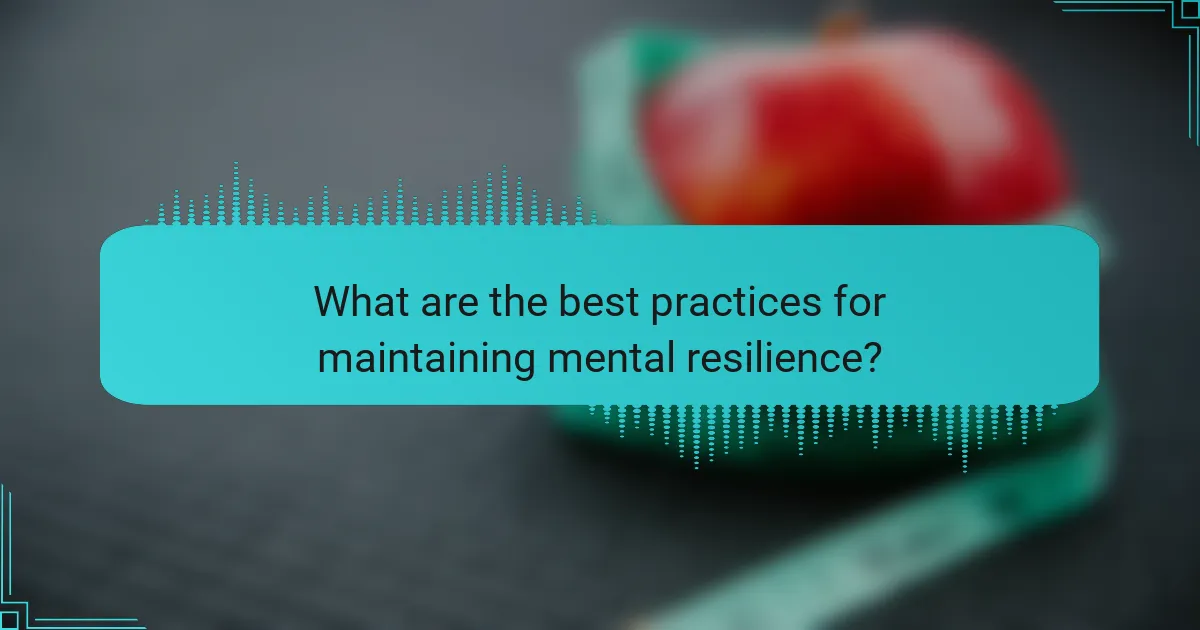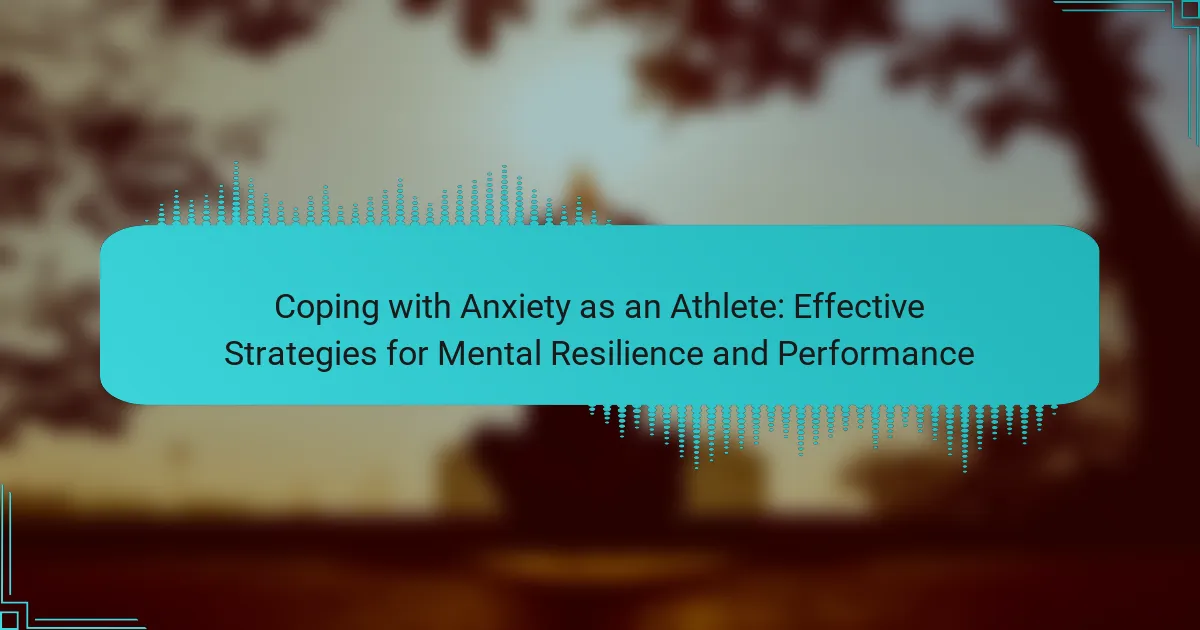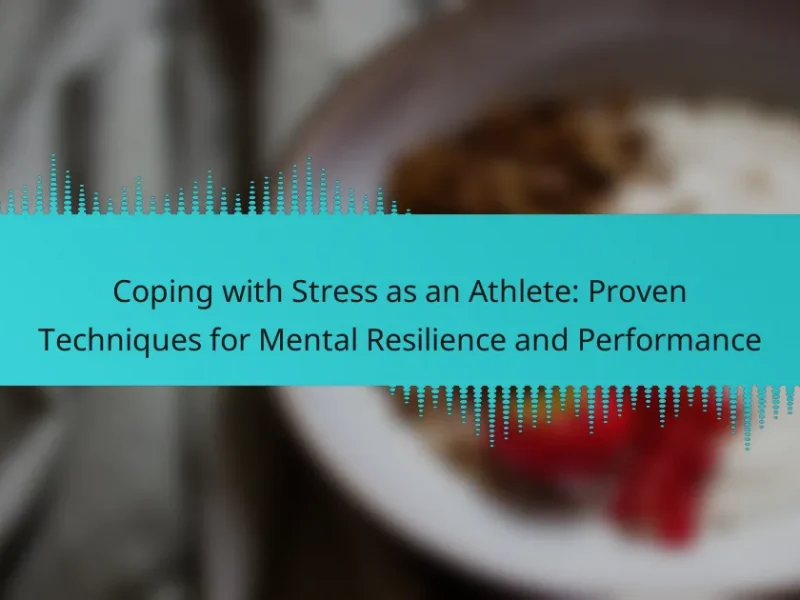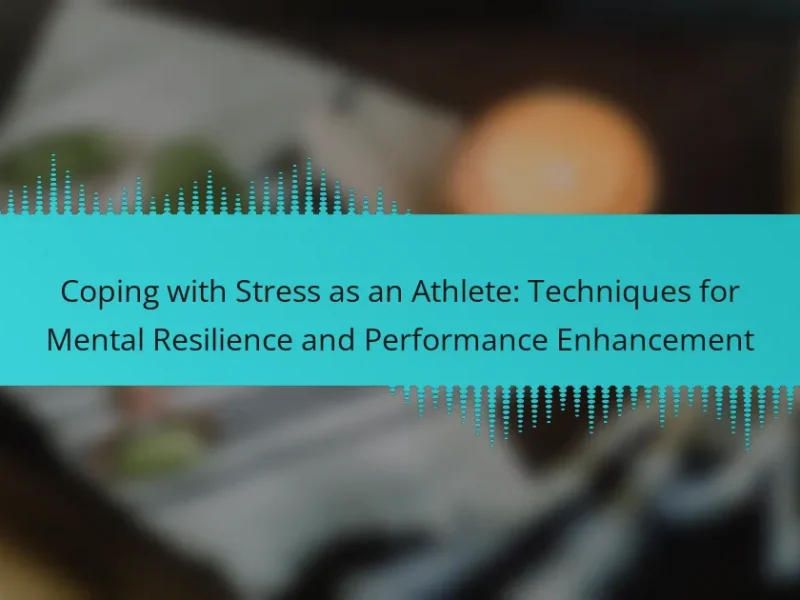Anxiety can severely hinder an athlete’s performance by affecting focus and confidence. Effective coping strategies include mindfulness techniques, visualization, and structured breathing exercises. Developing a pre-performance routine and building a strong support network further enhance mental resilience. Regular physical activity also plays a crucial role in managing anxiety and improving overall well-being.

How does anxiety impact athletic performance?
Anxiety negatively impacts athletic performance by impairing focus, reducing confidence, and increasing physical tension. Athletes may experience decreased endurance and coordination as anxiety levels rise. Effective coping strategies include mindfulness techniques, visualization, and structured breathing exercises. These methods enhance mental resilience and promote optimal performance under pressure.
What are the common symptoms of anxiety in athletes?
Common symptoms of anxiety in athletes include excessive worry, irritability, muscle tension, and difficulty concentrating. These symptoms can lead to decreased performance and mental resilience. Athletes may experience physical manifestations such as increased heart rate, sweating, and fatigue. Recognizing these symptoms is crucial for effective coping strategies and maintaining optimal performance levels.
How does anxiety differ between various sports?
Anxiety levels vary significantly across different sports due to unique competitive environments and physical demands. Team sports often involve social dynamics that can amplify anxiety, while individual sports may lead to heightened self-pressure.
For example, athletes in high-contact sports like football may experience anxiety from injury risks and performance expectations. Conversely, athletes in precision sports such as archery might face anxiety related to focus and mental clarity.
Research indicates that the coping mechanisms employed by athletes differ based on these contexts. Team athletes might rely on social support, while individual athletes may utilize visualization techniques.
Understanding these differences helps athletes develop tailored strategies for managing anxiety, enhancing both mental resilience and performance.

What universal strategies can athletes use to cope with anxiety?
Athletes can effectively cope with anxiety by employing strategies that enhance mental resilience and performance. Techniques include mindfulness meditation, visualization, and structured breathing exercises. These practices help athletes manage stress, improve focus, and maintain composure during competition. Additionally, developing a pre-performance routine can create a sense of familiarity and control, further reducing anxiety levels. Engaging in regular physical activity and seeking social support from teammates and coaches also contribute to improved mental well-being.
What role does physical conditioning play in reducing anxiety?
Physical conditioning significantly reduces anxiety by enhancing physical health and promoting mental resilience. Regular exercise releases endorphins, which improve mood and alleviate stress. Studies show that athletes experience lower anxiety levels compared to non-athletes, attributed to their structured training and discipline. Additionally, physical conditioning fosters a sense of accomplishment, boosting self-esteem and confidence. This unique attribute of physical activity creates a positive feedback loop, further mitigating anxiety symptoms.
How can athletes benefit from setting realistic goals?
Setting realistic goals helps athletes manage anxiety by providing clear, achievable targets. This approach fosters a sense of control and purpose, which enhances mental resilience. Research shows that athletes who set specific, measurable goals experience reduced stress levels, improving overall performance. Additionally, breaking larger objectives into smaller milestones allows for regular progress evaluation, further bolstering confidence and motivation.
What are the advantages of developing a pre-performance routine?
Developing a pre-performance routine significantly reduces anxiety and enhances focus. This structured approach helps athletes mentally prepare, creating a sense of control.
One advantage is improved consistency in performance. Athletes who follow a routine often experience reduced variability in their results. Another benefit is increased confidence; familiarity with the routine instills trust in their abilities.
Additionally, a pre-performance routine can serve as a mental cue, signaling the brain to shift into competition mode. This transition helps athletes manage stress and maintain composure under pressure.
In summary, a pre-performance routine fosters mental resilience, enhances focus, and promotes consistent performance, making it a valuable strategy for athletes coping with anxiety.

What unique techniques can athletes implement for mental resilience?
Athletes can implement techniques like visualization, mindfulness, and controlled breathing for mental resilience. Visualization helps athletes mentally rehearse performance, reducing anxiety. Mindfulness cultivates present-moment awareness, enhancing focus. Controlled breathing regulates physiological responses, promoting calmness under pressure.
How does visualization enhance performance and reduce anxiety?
Visualization significantly enhances athletic performance and reduces anxiety by creating mental simulations of success. This technique allows athletes to rehearse their skills, boosting confidence and focus. Studies show that visualization can lead to improved physical outcomes, as it activates similar brain pathways as actual practice. As a result, athletes experience lower anxiety levels, enabling them to perform under pressure more effectively.
What is the significance of positive self-talk in sports?
Positive self-talk significantly enhances an athlete’s mental resilience and performance. It reduces anxiety, boosts confidence, and fosters a focused mindset. Research indicates that athletes who engage in constructive self-talk experience improved performance metrics and lower stress levels. For example, a study showed that positive affirmations can lead to a 20% increase in performance outcomes. This practice serves as a unique attribute, distinguishing successful athletes from their peers. By consistently employing positive self-talk, athletes can cultivate a mental environment conducive to peak performance.
How can athletes leverage breathing techniques for anxiety management?
Athletes can effectively manage anxiety by using breathing techniques that promote relaxation and focus. Techniques such as diaphragmatic breathing help reduce stress hormones and enhance performance. Research shows that controlled breathing lowers heart rate and improves concentration, making it a valuable tool for athletes facing high-pressure situations. Regular practice of these techniques fosters mental resilience, allowing athletes to maintain composure during competitions.

What rare but effective practices exist for managing anxiety in athletes?
Mindfulness meditation is a rare but effective practice for managing anxiety in athletes. This technique enhances focus and reduces stress by promoting present-moment awareness. Research shows that regular mindfulness practice can lower anxiety levels and improve performance under pressure. Another unique strategy is visualization, where athletes mentally rehearse their performance, fostering confidence and reducing anxiety. Engaging in breath control exercises is also effective; these techniques help regulate physiological responses to stress. Finally, incorporating nature therapy, such as outdoor training sessions, can significantly alleviate anxiety, enhancing overall mental resilience.
How can engaging with sports psychology professionals help?
Engaging with sports psychology professionals enhances athletes’ mental resilience and performance. They provide tailored strategies to manage anxiety and improve focus. Professionals utilize techniques such as cognitive-behavioral therapy, visualization, and mindfulness to help athletes cope with stress. Research shows that mental skills training can lead to improved performance metrics and overall well-being. Regular sessions with a sports psychologist can foster a growth mindset, enabling athletes to embrace challenges and setbacks as opportunities for development.
What role does nutrition play in mental health for athletes?
Nutrition significantly influences mental health in athletes by enhancing mood, focus, and resilience. A balanced diet rich in omega-3 fatty acids, antioxidants, and vitamins can reduce anxiety and improve cognitive function. For example, studies show that athletes consuming adequate nutrients experience lower stress levels and better performance. Additionally, hydration plays a crucial role in maintaining mental clarity and emotional stability. Prioritizing nutrition fosters mental resilience, essential for coping with competitive pressures.
How can mindfulness practices be adapted for athletes?
Mindfulness practices can enhance athletes’ mental resilience and performance by reducing anxiety. Techniques such as focused breathing, visualization, and body scans can be tailored to fit training schedules and competitive environments. Incorporating mindfulness into daily routines fosters a greater sense of control and presence, which is crucial during high-pressure situations. Additionally, athletes can benefit from group mindfulness sessions, promoting camaraderie and shared experiences that strengthen mental fortitude.

What are the best practices for maintaining mental resilience?
To maintain mental resilience, athletes should adopt effective coping strategies. These practices include developing a strong support network, utilizing mindfulness techniques, setting realistic goals, and engaging in regular physical activity.
Building a support network provides emotional stability, allowing athletes to share experiences and seek guidance. Mindfulness techniques, such as meditation and deep breathing, enhance focus and reduce anxiety. Setting realistic goals helps athletes manage expectations and fosters a sense of achievement. Regular physical activity not only improves physical health but also boosts mood and mental clarity.
Incorporating these strategies can significantly enhance an athlete’s mental resilience, enabling better performance under pressure.
How can athletes identify and avoid common mistakes in anxiety management?
Athletes can identify and avoid common mistakes in anxiety management by recognizing triggers and implementing effective coping strategies. Key mistakes include neglecting mental preparation, failing to practice relaxation techniques, and not seeking support.
Understanding personal anxiety triggers is crucial; athletes should keep a journal to track situations that heighten anxiety. Practicing mindfulness and visualization can enhance mental resilience. Additionally, engaging in open communication with coaches and teammates fosters a supportive environment.
Regularly reviewing performance under pressure helps athletes learn from experiences. Incorporating these strategies can significantly improve mental control, leading to better performance outcomes.
What optimization tips can enhance coping strategies for athletes?
To enhance coping strategies for athletes, focus on mindfulness, structured routines, and positive self-talk. Mindfulness practices, like meditation, improve focus and reduce anxiety. Establishing structured routines helps create a sense of control, while positive self-talk fosters resilience. Incorporating these strategies can significantly boost mental performance.
What expert insights can guide athletes in overcoming anxiety?
Athletes can overcome anxiety by implementing strategies such as mindfulness, visualization, and structured routines. These techniques enhance mental resilience and improve performance. Mindfulness practices help athletes stay present, reducing anxiety levels. Visualization allows athletes to mentally rehearse successful performances, fostering confidence. Establishing structured routines creates a sense of control, which can mitigate anxiety. Regular physical activity also contributes to overall mental well-being, providing a natural outlet for stress.


